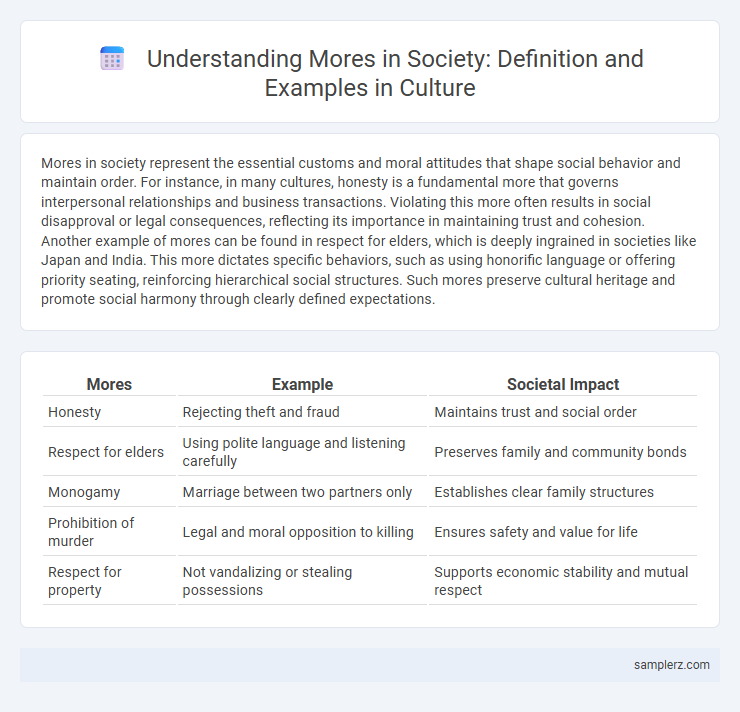Mores in society represent the essential customs and moral attitudes that shape social behavior and maintain order. For instance, in many cultures, honesty is a fundamental more that governs interpersonal relationships and business transactions. Violating this more often results in social disapproval or legal consequences, reflecting its importance in maintaining trust and cohesion. Another example of mores can be found in respect for elders, which is deeply ingrained in societies like Japan and India. This more dictates specific behaviors, such as using honorific language or offering priority seating, reinforcing hierarchical social structures. Such mores preserve cultural heritage and promote social harmony through clearly defined expectations.
Table of Comparison
| Mores | Example | Societal Impact |
|---|---|---|
| Honesty | Rejecting theft and fraud | Maintains trust and social order |
| Respect for elders | Using polite language and listening carefully | Preserves family and community bonds |
| Monogamy | Marriage between two partners only | Establishes clear family structures |
| Prohibition of murder | Legal and moral opposition to killing | Ensures safety and value for life |
| Respect for property | Not vandalizing or stealing possessions | Supports economic stability and mutual respect |
Understanding Mores: Defining Societal Norms
Mores represent the essential customs and moral attitudes that govern behavior in society, such as prohibitions against theft or murder which underscore a community's core values. These societal norms are more strictly enforced than folkways, reflecting collective judgments about right and wrong. Understanding mores provides insight into the ethical foundation that maintains social order and promotes cohesion within a culture.
Historical Examples of Mores Across Cultures
Historical examples of mores across cultures include the Confucian emphasis on filial piety in ancient China, which dictated strong familial loyalty and respect as essential societal norms. In medieval Europe, the chivalric code established rigid mores around honor, bravery, and courtly conduct, shaping social behavior among the nobility. Indigenous Australian societies maintained strict mores regarding land stewardship and kinship responsibilities, reinforcing community cohesion and spiritual connection to country.
Mores in Family and Relationship Structures
Mores in family and relationship structures often dictate roles, responsibilities, and expected behaviors, such as parental authority and spousal fidelity, which maintain social order and cohesion. In many cultures, strict adherence to these mores ensures respect for elders and the preservation of kinship ties across generations. Violations of these norms, like infidelity or neglect of familial duties, can lead to social sanctions or ostracism within the community.
Religious Mores Shaping Social Behavior
Religious mores profoundly influence social behavior by establishing moral codes and rituals that guide daily interactions and community norms. For instance, dietary restrictions in Islam and Judaism shape food practices, while Sabbath observance in Christianity and Judaism dictates rest and worship patterns. These religious norms promote social cohesion by fostering shared values and reinforcing group identity.
Mores in Dress and Appearance Standards
Mores in dress and appearance standards regulate societal expectations on clothing, grooming, and overall presentation, reflecting cultural values and social norms. In many conservative societies, modest attire is mandated to uphold religious or traditional mores, while in professional environments, formal dress codes emphasize respect and authority. Deviations from these mores can often lead to social sanctions, highlighting their role in maintaining cultural cohesion and identity.
Codes of Conduct: Mores in Public Etiquette
Mores in public etiquette include widely accepted codes of conduct such as maintaining personal space, refraining from loud conversations in quiet settings, and dressing appropriately for formal occasions. These unwritten social rules guide behavior to ensure respect, harmony, and predictability in public interactions. Violations of these mores often result in social disapproval or sanctions, reinforcing their role in cultural cohesion.
Legal Systems and the Enforcement of Mores
Mores in society are often codified into legal systems that establish norms for acceptable behavior, such as laws against theft, assault, or fraud. Enforcement mechanisms, including policing and judicial proceedings, ensure compliance with these moral standards by imposing penalties or sanctions on violators. The close relationship between mores and law underscores how deeply cultural values shape and regulate social order.
Generational Shifts in Societal Mores
Generational shifts in societal mores are evident in changing attitudes toward marriage, with younger generations increasingly embracing cohabitation and diverse relationship structures. Views on gender roles have evolved, reflecting a growing acceptance of equality and fluidity that contrasts with traditional expectations held by older generations. These shifts impact social norms and behaviors, demonstrating the dynamic nature of culture influenced by evolving values over time.
The Role of Mores in Educational Settings
Mores in educational settings shape acceptable behaviors like respect for authority, punctuality, and academic honesty, reinforcing social norms and promoting a cohesive learning environment. These deeply held cultural standards guide teacher-student interactions and peer relationships, influencing discipline policies and classroom management. Upholding mores ensures a consistent framework that supports moral development and community values within schools.
Mores and Their Impact on Social Change
Mores are deeply held societal norms that govern moral behavior, such as prohibitions against theft, murder, and dishonesty, shaping the ethical foundation of communities. When mores evolve, they often drive significant social change by challenging outdated practices and promoting new values, exemplified by shifts in attitudes toward civil rights and gender equality. The transformation of mores fosters greater social cohesion and progress by redefining acceptable conduct and influencing laws and cultural expectations.

example of mores in society Infographic
 samplerz.com
samplerz.com